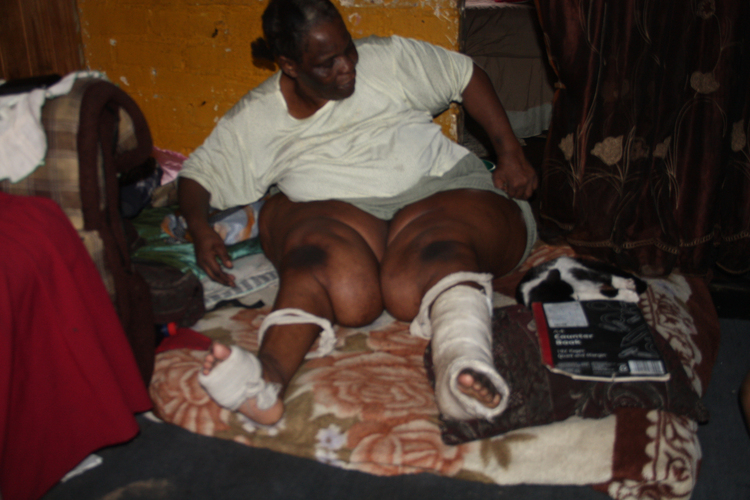
The Sunday Mail

Sixteen-year-old Panashe Wakatama’s day begins at 4 am.
The house that he shares with his 60-year-old grandmother and two cousins — Chantell (10) and Anenyasha (3) — has two small rooms and old pieces of furniture.
These children have a special task — getting Mbuya Miriam Mbodo Wakatama comfortable on her makeshift bed every day.
Mbuya Wakatama weighs 200 kilograms.
Hardly able to walk, she spends her days in bed, relying on her grandchildren to sit up, eat and bath — just about everything.
When she tried to walk in 2014, she broke her right leg.
“My grandchildren do all the chores while I supervise them from my bed. The day begins with them cleaning and cooking. Then they bath, after which they help me bath,” Mbuya Wakatama told The Sunday Mail when our crew visited paid her a visit in Mufakose, Harare.
“I can no longer walk to the bathroom, so they spread huge plastics where I sit and bath. They cannot carry me to the toilet either, hence, they spread newspapers on the floor.”
She continued: “When I am done, one of my grandchildren disposes the newspapers in the toilet, while the other two help me back on to the mattress.
“When I want to pass some water, I do so in a cup. It is easier that way as I can remain on the mattress, and the cup can be emptied and returned.”
Mbuya Wakatama and her twin sister are the last-borns in a family of eight. She says her twin sister weighs much less than she does and leads a normal life.
She got married in 1983 and was blessed with six children.
In 2000, she was diagnosed with a heart ailment.
Later she started gaining weight, something that she and her husband dismissed as “a sign of good living”.
“At that time, my husband was still working and took good care of the children and I. So, when the weight gain began, many people, myself included, thought it was the good life,” she recalls.
In 2006, her husband died after a short illness.
“A few months afterwards, I began experiencing walking difficulties and had recurring backaches. I linked this to the stress of losing my husband.
“Paying rentals then became a nagging headache, the landlady occasionally excreted in the sink I used to wash my dishes, protesting late rent payment. This stressed me further. I had to leave, but had nowhere else to go.”
By this time, Mbuya Wakatama’s health had deteriorated.
She gained additional weight and could no longer walk.
She then got a wheelchair.
However, doctors could not establish the cause of her ballooning form.
Still, the condition persisted.
In 2008, she sought Government assistance and duly received it in 2010 with the allocation of the Mufakose home.
Glimmers of hope started to appear.
But soon, shadows of misfortune emerged as her children “started behaving strangely”.
“My sons do not take care of me and my daughters do not see eye to eye. Whenever my daughters meet, they fight like wildcats. My sons, too, do not respond to my cry for help,” she said, as she battled some tears.
“They have turned their backs on me. My twin sister and grandchildren are the only ones who care. These grandchildren were left by my children. One of my children died, another one is in prison and the third one just disappeared.”
Experts say if the cause of her obesity was established, she would require four operations to correct it.
Her wish is simple.
“I just want to walk again, doing things on my own as I used to. I still have hope that I will walk again some day if I get help from health specialists and prophets like TB Joshua and Emmanuel Makandiwa.”
In the meantime, Panashe’s struggle continues.
At sunset, he has to prepare the little food in their house and stay alert, just in case granny needs him during the night.



